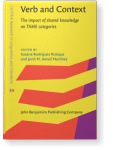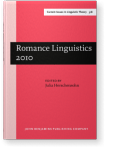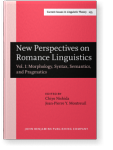Alda Mari
List of John Benjamins publications for which Alda Mari plays a role.
2023 Solipsistic and inter-subjective attitude reports: From representational to volitionals Verb and Context: The impact of shared knowledge on TAME categories, Rodríguez Rosique, Susana and Jordi M. Antolí Martínez (eds.), pp. 171–202 | Chapter
This paper establishes a difference between solipistic and inter-subjective profiles of the attitudes across the epistemic and the bouletic domain. Revisiting the classical Hamblinian view, we propose that attitudes feature speech-act like content, which present p for uptake in the common ground… read more
2018 Chapter 8. The French future: Evidentiality and incremental information Evidence for Evidentiality, Foolen, Ad, Helen de Hoop and Gijs Mulder (eds.), pp. 199–226 | Chapter
We propose a new analysis for the French future, which treats it as a modal-evidential, articulating two perspectival points – a conjectural and a ratificational one. Considering that future also contributes a relative tense, we explain a variety of uses covering previously unexplained cases,… read more
2011 Another look at Italian generic sentences Romance Linguistics 2010: Selected papers from the 40th Linguistic Symposium on Romance Languages (LSRL), Seattle, Washington, March 2010, Herschensohn, Julia (ed.), pp. 223–238 | Article
In this paper we reconsider the interpretation of indefinite singular generics and definite plural generics in Italian. We show that these two types of statements cannot be associated with the traditional distinction between definitional vs. accidental generalizations. In particular we argue that… read more
2006 A Unified Account for the Additive and the Scalar Uses of Italian Neppure New Perspectives on Romance Linguistics: Vol. I: Morphology, Syntax, Semantics, and Pragmatics, Nishida, Chiyo and Jean-Pierre Y. Montreuil (eds.), pp. 187–200 | Article
In this paper we present a unified analysis of the negative concord item of Italian neppure. This item has an additive and a scalar interpretation corresponding to too and even of English. Our claim is that, under both of these interpretations, neppure presents a class or series as closed. The way… read more



